Doable Ideas for Compiling Your Life/Family History Part 1
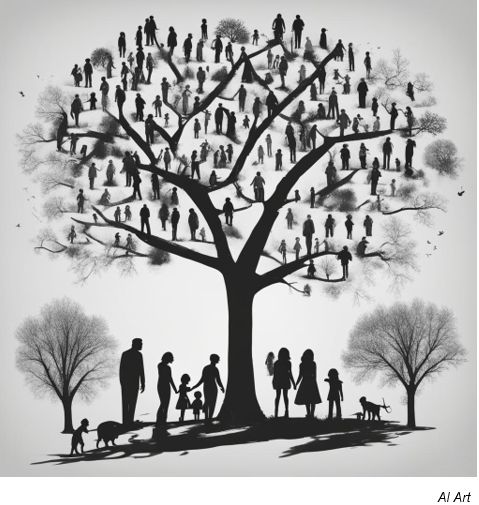 15
15Sep

Deer in the Headlights?
I recently helped an Arizona cowboy with his family history book and was asked by the family history consultant at my church to share the final published product at our family history center. I was so on fire from my amazing experience with the book, I volunteered, in addition, to teach a class on how to put together a family history book for “regular Joe’s”—nonprofessionals. One Sunday, I was sitting in a church meeting, and an announcement was made about my upcoming class. I was surprised at how the room immediately grew silent, and most everyone seemed to be looking down at the floor with a facial expression like deer in the headlights!
I recalled doing the same thing in the past and thought about how many of us may have good intentions and a desire to put together our life/family book but feel completely overwhelmed and inadequate. For many individuals, writing a book for an audience, however small or large, is a formidable task–intimidating! Some people are unconfident because they do not consider themselves writers. And they don’t know where to start. They are lost.
The moment I observed the obvious, less than enthusiastic response to my upcoming class, I realized that the word, “book,” had overwhelmed and shut down many people right off the bat. The inspiration immediately came to me to take the word, “book,” out of the title of my class and go at it from a less intimidating, more user-friendly angle. I called it: “Doable Ideas for Compiling Your Story.” 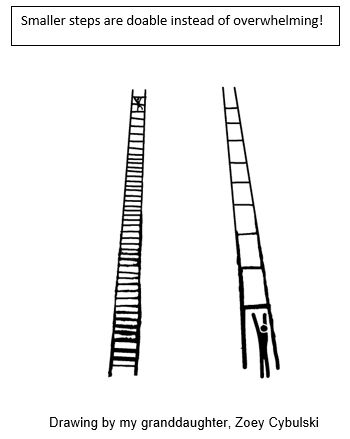 By taking one small step at a time, a monumental task can become doable. There’s only one way to eat an elephant—one bite at a time! I realized that if I could break down the grand, overwhelming task of putting together a life or family book into doable steps, I could perhaps motivate a lot more people to finally get around to it. This set off a passionate, whirlwind brainstorm in my head to share. My goal is to inspire a paradigm change in others who are overwhelmed and incapacitated by the “B” word (book) that will empower them to record their unique, priceless story for posterity’s sake!
By taking one small step at a time, a monumental task can become doable. There’s only one way to eat an elephant—one bite at a time! I realized that if I could break down the grand, overwhelming task of putting together a life or family book into doable steps, I could perhaps motivate a lot more people to finally get around to it. This set off a passionate, whirlwind brainstorm in my head to share. My goal is to inspire a paradigm change in others who are overwhelmed and incapacitated by the “B” word (book) that will empower them to record their unique, priceless story for posterity’s sake!
Think Outside the “Book”!
So, in my class, I challenged everyone to, instead of thinking outside the box, to think outside the “book” (for the time being anyway). I explained that a life or family story doesn’t have to be an all-inclusive account of every detail of your or your ancestors’ lives--a grandiose, perfect A to Z narrative with all the trimmings--asap. Instead, it can be accomplished in doable snippets--a work in progress over time. With tongue in cheek, to lower the bar and take the pressure off, I shared that by literal definition, a book is simply “a set of written or printed sheets of paper bound together between a front and back cover!” So, everyone relax!
Gathering Information
As I mentioned, the “B” word (book) is overwhelming to many people who do not consider themselves writers! This is often a big stumbling block to them doing their life or family story. I emphasized to my class that there actually is so much great information to be gathered for a life or family story that does not involve any writing at all! So, a first, small, doable step in compiling your family story can simply be gathering “pieces” of information.
Here are some ideas for gathering info: (Of course, there are many more, and I encouraged my class members to add to the list.)
- Photos
- FamilySearch Info (https://www.familysearch.org)
- Fan Charts
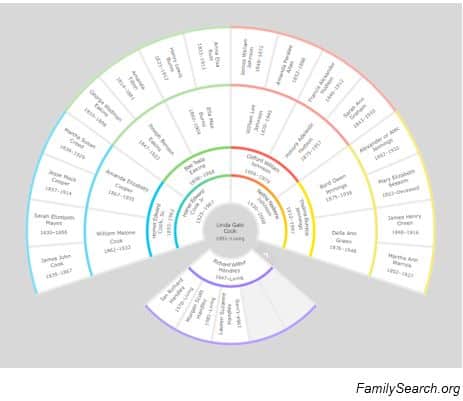
-
-
- Family Trees
- Pedigree Charts
- Life Timelines
- Vital Statistics Records - I.e., Birth, Marriage, Death Certificate
- Military Records
- Memories – Family Photos, documents, recordings, and stories.
- Etc. (Lots more)
- Genealogy Library Info
- Google Info
- Newspaper Clippings
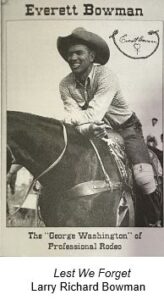
- Scrap Books
- Letters
- Certificates/Awards
- Obituaries/Funeral Programs
- Info from Historical Books or Other Publication
- Resumes
- Family Interviews
- Stories/Poetry/Art by Family Members
- Journals/Diaries
- Lyrics of Favorite Family Songs
- Favorite Family Recipes
- List of Church Service
- Etc!
I tried to include some creative ideas in this list above because when I have talked to others about family history books, they say if there is only text, they read a page or two, then put the book down, never to pick it up again. The thing I noticed that worked amazingly well in the Arizona cowboy’s book was that he included a variety of elements that broke up the text nicely and added interest. This seems to be imperative to keep readers’ attention these days. I will be discussing doable ideas for content using a snippet approach that will help achieve this in Part 2 of my blog.
Journalism Degree NOT Required: Just Write “to” Your Kids/Family
In school, each and every one of us had to learn the 3 Rs--reading, writing, and arithmetic. So, “YES,” we all can write even if we don’t feel that we are writers and don’t have a journalism degree. We have written school assignments, diaries/journals, cards, letters, resumes, etc.! I told my class to keep in mind, you are typically writing your family story “to” YOUR KIDS, YOUR FAMILY, not for Harvard University! We just need to change our paradigm and write something for our family to create at least some sort of a record of our lives on this earth. We will not be graded this time! And even though you will have to read and write to do your story, count yourself lucky that at least there’s no arithmetic involved! The bottom line is your family wants a part of you and your life to cherish even if you don't write with correct grammar, spelling, and eloquence. Don’t make your loved ones wait until your funeral to hear about your life!
In the cowboy’s book I edited, there was one story authored by an ancestor who had very little education, yet she persevered in recording her story. It took me an hour to decipher and type one page. However, the author’s unique details and colorful experiences powerfully trumped the poor grammar, spelling, and lack of eloquence! This story became a great, cherished piece in the book despite its rough edges!
Writing Help Is Available
- FamilySearch StoryAssist
https://www.familysearch.org/rootstech/session/write-a-story-with-storyassist) You enter your story details, and it writes the rough draft for you. Other similar services are available.
- FamilySearch Record My Story
https://www.familysearch.org/discovery/recordme/
Tell your stories and the stories of your family by answering questions or interviewing others and having them answer the questions. There are other similar services available.
- Printed Grandma/Grandpa Journal
For example: Grandma, Tell Me Your Story; a Guided Journal, Publications International, Ltd.
The journal guides you through your life story. It is filled with questions that you just answer, so at least you don’t have to think of what to write about. For example: “Did your family take vacations? If so, what were your favorite vacation spots?” “What types of games did you like to play?”
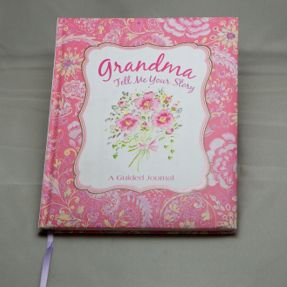
- Cell Phone Voice Memos – A different angle is to make recordings of yourself or family members on your cell phone to transcribe.
- Family/Friend Team – Recruit family members or friends with writing skills to help you. Put your heads together!
I have a distant relative who compiled and published a family history book in a looseleaf binder who, in her “Acknowledgements,” thanked and listed the names of 40+ family members who contributed information. It can happen!
- Life Historians & Book Designers for Hire
Record and Share “You!”
The priority in all this is to simply create a record of YOU and/or your family/ancestors in some form or fashion. Any record is better than no record, whether you realize it or not!! It is somewhat of a mystery to me, but I have learned for myself that this record is not just another book or document, it is a unique and powerful beacon that somehow, some way, helps lead the way for your posterity. It connects them with you, if you are writing your own life story--your values, your character, your grit, your life experiences, and lessons. It connects them with your ancestors, if you are writing about them. It is a precious, valuable handbook of life of sorts that lays your example (or your ancestors’) before them and helps them understand, navigate, and persevere in life—the good, bad, and the ugly! This special magic happens even when content is not Harvard quality!
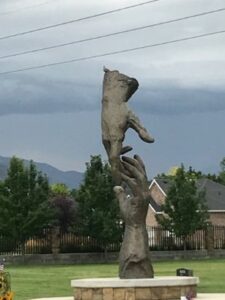
If you need help gathering information about your family and ancestors, the experts at Price Genealogy can assist you.
Linda
-
-
Instroductory picture created with Al Art my Michelle Handley
